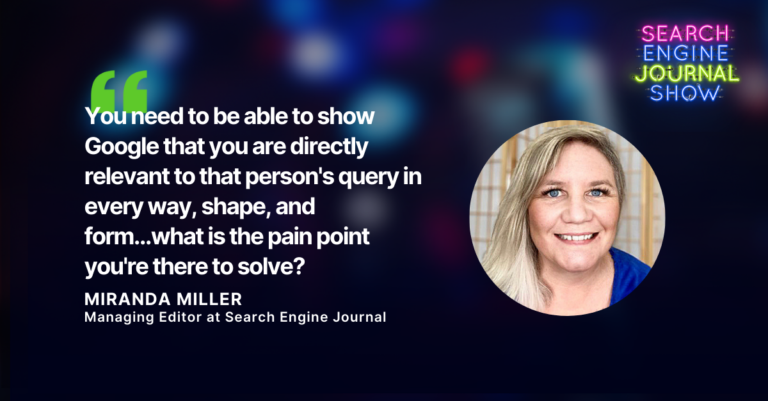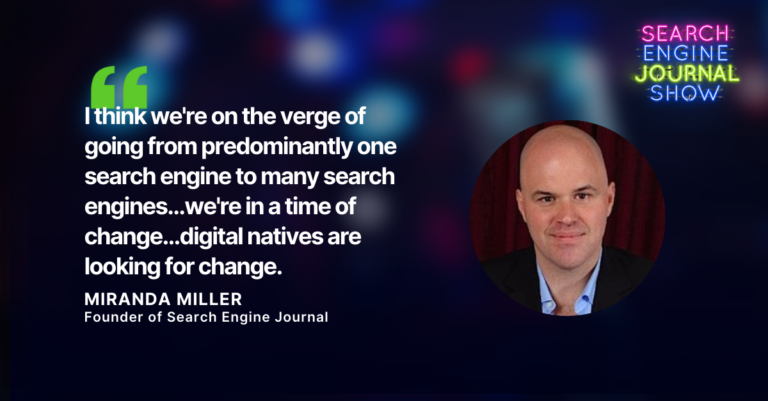Page Experience, Core Web Vitals, and link spam, oh my!
Those looking for a bit of respite from the chaos of 2020 found more of the same in 2021 as the ongoing pandemic and a series of substantial Google updates and announcements kept the SEO industry on our collective toes.
Now that we’ve turned the page and 2022 is well underway, where should you focus your SEO resources, talent, and time?
What SEO trends do you need to keep on your radar to future-proof your strategy?
Miranda Miller, our Managing Editor, joined our founder and host of The Search Engine Journal Show, Loren Baker, to chat about the SEO trends our expert contributors are calling out as most impactful for the year ahead.
In the SEO Trends 2022 ebook, you’ll discover what 44 industry experts are thinking and planning around content quality, searcher intent, evolving SERP features, smart automation, and more.
Catch Baker and Miller’s commentary on their favorite SEO trends, news about specific Google features and updates, and more in this episode of The Search Engine Journal show.
Read on to learn the top 10 trends you need to know for 2022 planning from our panel of experts in search marketing and get the full ebook (free to download) for more from each expert.
1. User Intent
One of the most talked-about topics for 2022? User intent. It’s a trend that’s here to stay.
Kristina Azarenko, SEO Consultant & Founder of MarketingSyrup Digital Inc., believes it’s time for people to finally “stop thinking in terms of ‘SEO content’ and create content for users with the intent and keywords in mind.”
Himani Kankaria, Founder at Missive Digital, said, “Considering the updates like Google rewriting meta title tags and coming up with indented results on SERPs in 2021, it seems Google is working hard to identify the right intent behind a user’s search, irrespective of the type of queries.”
That’s where SEO professionals need to focus on bringing a holistic approach to your content strategy in 2022, she said.
“Be it video, blog, or web content, it must be planned for the keywords, users’ intent behind searching and consuming them, your intent behind creating them, and the stage at which your consumers are in the buyer’s journey,” Kankaria added.
Suganthan Mohanadasan, Co-founder & Technical SEO Lead at Snippet Digital, agrees.
“Search intent will become ever more important in 2022,” he said. “Understanding search intent continues to become more important than ever, particularly with the introduction of Google’s Multitask Unified Model (MUM) update.
“I think we will see more search marketers rethink their approach to content creation by focussing on understanding search intent more intelligently,” Mohanadasan added, noting that keyword research will always remain an important bedrock to organic search strategy.
Even so, we need to be able to look beyond keywords in their raw form and draw meaningful insight from them.
“Understanding the relationship between your keywords and knowing how to target them to meet the search intent is already the key difference between an effective and ineffective search strategy, but in 2022 it will become even more vital,” Mohanadasan said.
Mordy Oberstein, Head of Communications at Semrush, thinks that 2022 will be the year it finally pays off to take user intent seriously.
“In 2022, we’ll take it to a new level. I don’t mean merely breaking things down by informational or transactional intents, etc. I mean, considering everything intent encapsulates for the multiple user profiles who might find the same piece of content useful,” Oberstein said.
“It’s the ability to adequately empathize with your audience so as to provide a comprehensive experience that addresses their implicit concerns,” he added.
 [40:55] – SEJ Show EP 257
[40:55] – SEJ Show EP 2572. Content Quality
Brodie Clark, SEO Consultant at Brodie Clark Consulting, said marketers need to watch for what he calls “The Site-wide Content Quality Effect.”
“One aspect I regularly see for large sites while completing audits is many pages being categorized as ‘Discovered, currently not indexed’ in Google Search Console. Get familiar with this exclusion type within the Coverage report in GSC and pay attention to the patterns Google is trying to highlight,” Clark said.
“Google has said in the past that you should be making sure published pages (that are indexable) should be fantastic,” he said. “Stick to this as your SEO mantra, and you’ll have a future-proof SEO strategy ready for 2022.”
But why is this happening?
“Many are doing short-term SEO efforts mainly to gain links and awareness from digital PR, adding hundreds of content, or only tackling specific technical SEO fixes,” said Motoko Hunt, President of International Search Marketing Consulting | AJPR.
Hunt explains that while these work well for quick wins, they are not long-term solutions.
“This trend also created so much similar content on the web. Considering the MUM update, it is important to publish unique content covering specific topics that are not covered by other websites,” Hunt said.
“Rather than adding hundreds of generic content to the site, research the overall interests of the target audience, organize those entities by the topic, and prioritize them by the relevance to the business goals,” Hunt added. She recommends that marketers focus on the information that is uniquely different from others and highlight your specialty in the topic area.
Jesse McDonald, Global SEO Strategist at IBM, shares a similar outlook.
“With recent enhancements to Google’s algorithm in the way of BERT and MUM, I think more and more SEO professionals are going to focus on the quality of their content and site structure,” McDonald said.
While content has always been a focus of SEO professionals, with these updates, it’s going to be easier to speak to the quality of content being something that deserves focus, McDonald added.
Jamie Indigo, Senior Technical SEO Lead at DeepCrawl, said, “To succeed post-paradigm, you need to focus on creating content that is factual and useful. The big winners will be those sites known for their contributions to their targeted subject matter.”
And Kelsey Jones, Senior Director of Content for Awesome Motive, suggests that marketers quit siloing content and SEO.
“I thought this wasn’t an issue in today’s workforce, but I’ve found that it’s rare to find a writer with SEO expertise and vice versa. This signals a big knowledge gap between content and SEO that goes both ways,” Jones said.
“Of course, it’s great to specialize, but being a writer without SEO experience or being an SEO pro who doesn’t understand the nuances of content writing can be really detrimental to your content’s performance,” she added.
Jones advises that if you can’t better integrate the roles (e.g., pay more for a writer with SEO experience), it’s important to work hard on better integrating the teams, so they are both more involved in the creation process and cross-trained in all steps.
“It’s also always worth paying for training, books, or resources for teams who want to learn SEO or how to write better,” she said.
 [23:15] – SEJ Show EP 247
[23:15] – SEJ Show EP 2473. Localization Of SERPs & SERP Changes
Indigo reminds us that “Misinformation is pushing Google to create a fact-oriented SERP. Search results are powerful. Simply seeing an idea repeated across page titles in a SERP can reinforce a belief.”
“Google is often experimenting with changes to the mobile layout for local intent specifically,” said Amanda Jordan, Director of Local Search at LOCOMOTIVE Agency, adding that she foresees continued testing and changes in this area, especially for growth in online shopping, reviews, trust signals, and brand awareness.
“My recommendation is to focus on reputation on third-party and industry sites as well as wikis, GMB completion, site markup, and knowledge panels,” Jordan said.
Helen Pollitt, SEO Manager at iTech Media, also discusses the localization of SERPs and how it relates to content.
“Google will be focusing a lot more on the localization of content over the next year. In 2021 we already saw more websites with country-specific content outranking those that used to be top of the SERPs but are more globally focused,” Pollitt said. “This will only get more obvious in 2022 even for purely online businesses with no brick and mortar offering.”
For sites that are not just targeting one country, it will be increasingly necessary to create local-focused content, she said.
“Look at your key search terms that show some local intent. For instance, ‘[x online service] Canada’ – if you are seeing search results being served that have obvious keyword targeting for ‘Canada,’ you may be in an industry where Google is showing more localized SERPs,” Pollitt said.
“In that case, you will need to look at creating Canada-specific pages where you perhaps had globally-focused ones previously. You will need to show local relevance in your content, as well,” she added.
4. Images & Visual Content
Baker believes that marketers’ dependence on stock imagery is set to decline.
“Sites with unique images will see a large boost in Image, Product, and normal search,” Baker said. “This is also a user behavior/intent reaction as younger users identify or resonate with unique lifestyle images and can instantly tell if something is real or staged.”
“By rewarding sites that use original imagery, more will be created. Google Lens then learns more,” he added, noting that this incentivizes the growth of original content from creators while learning more about areas, people, products, etc.
Indigo reminds us that at Search On 2021, Google announced a push to make SERPs more visually browsable and intuitive.
“This means bigger image blocks are displayed in the results for some queries. The boon of good image assets isn’t limited to SERP,” she said. “Google Lens will enable shoppers to look for a product using a photo on their device or found on a website – essentially a reverse image search with a solid use case for image optimization.”
Google Discover is also leveraging images, Indigo noted. She added that a recently Google-published case study showed that sites using the max-image-preview:large meta tag could see an increase in click-thru rate by 79% and an increase in total clicks by up to 333%.
“While Discover has been largely overlooked as an SEO opportunity, the inclusion of Discover data into the Search API shows that unified data sources and best practices are going to continue,” Indigo said.
She adds that we can reasonably hypothesize that with the new 4-page scroll of the SERPs on mobile and the increase of images, normal search will start looking a lot more like Discover.
Eli Schwartz, Growth Advisor at Eli Schwartz, believes AI is set to make search much richer.
“Google Images are not going to just be a secondary search engine,” Schwartz said. “AI is going to allow Google to recognize when an image or video might be the best result for a user.”
Google has already revealed some of the capabilities they have in this area.
“And with Google Lens now a primary search action on Android devices, expect direct image search to grow even more,” Schwartz advises.
He also believes there’s going to be another search option by the end of the year.
“It could be growing market penetration from DuckDuckGo or Bing or something totally new, but all SEO pros should be wise to the potential of the growth of another search engine and not just focus on Google,” Schwartz said.
 [29:43] – SEJ Show EP 257
[29:43] – SEJ Show EP 2575. Automation
Andreas Voniatis, the Founder of Artios, observes that automation of SEO practices – whether technical audits, competitor analysis, or search intent analysis – has already started this year and in 2022 will become even more widespread.
“As more SEO professionals worldwide become increasingly Python-savvy, we’ll see more automation, especially in agencies where more will automate as much of the technical audits, tools for analysis, and other areas of research, as much as possible,” Voniatis said.
He added for those who started this year or earlier: “We’ll see the automation of technical audits to make use of machine learning to segment technical issues by content type making the automation of technical audits more ‘intelligent.’”
Aleyda Solis, International SEO Consultant & the Founder of Orainti, believes that marketers should leverage SEO automation for quality assurance.
“The implementation of real-time SEO validation and alerts systems within our platforms, to avoid the generation of issues in the first place or monitor them in real-time to be warned as soon as they happen will become more important to avoid very common SEO horror stories” Solis said.
Mark Traphagen, VP of Product Marketing and Training at seoClarity, agrees we’ll see automation.
“The pace of change in SEO has continued to increase exponentially, while at the same time enterprise SEO professionals are dealing with ever larger and more complex sites,” he said. “The need for better automation to overcome gaps in technology, skills, and resources to be able to scale execution is rapidly passing from a ‘nice to have’ to a necessity.
Traphagen added that data is abundantly available now and has become a commodity.
“The challenge is reducing the time from data acquisition to insights to action. SEO pros (and the tools they use) will need to invest significantly more in developing automation in the year to come,” he said.
Traphagen advises that particular areas to investigate include the use of Edge technology to implement changes faster, AI-driven analysis to cull signals from the noise of data, and highly-customizable intelligent alerts.
And Miranda Miller, Managing Editor at Search Engine Journal, believes SEO pros and content creators should be investigating their options for automating content creation.
“We can get an assist in competitive research, analyzing existing SERPs, and understanding related entities and concepts from technology,” Miller said. “But I don’t foresee any point in the next decade where automated content creation will satisfy user and search engine requirements without the assistance of editorial process and human creativity.”
“The possibility that I might one day soon be able to train my own language model(s) and scale my efforts in that way is exciting. For SEO pros who focus on content and on-page, this will be a growing area of opportunity in 2022 and beyond,” she added.
6. Natural Language Processing & Machine Learning
Michael King, Founder & Managing Director at iPullRank, doesn’t believe there will be major changes in 2022. But he said, “…there are a lot of more subtle shifts that we’re seeing that point to the same two things: natural language generation and data pipelining.”
“Google’s evolution of multi-modal search suggests that there’s a bigger focus on search journeys rather than individual queries,” he said.
“This has interesting implications with respect to how we need to judge things such as co-occurrence and named entity recognition when we’re doing our own optimization,” King said.
“Google’s shift towards being able to tease out subtopics from broader pages is an indication that more robust content has a better chance to perform in the long tail than it has previously,” he added, noting that Apple and Google will continue to march us towards their data monopolies with the eventual death of cookies.
According to King, this further indicates a need for the collection of first-party data and pushing that data into a data store like BigQuery so you can capitalize on it for a variety of optimizations.
“People who capitalize on this data collection and find ways to combine it with advancements in Natural Language Generation and the understanding of the entity and keyword relationships will be able to scale the creation of robust content that’s positioned to rank,” King said.
Alexis Sanders, Director at Merkle, reminds us that iterations on machine learning natural language models have continually improved multiple times every year.
“Best-in-class models used on the SQuAD dataset exceeded human performance in terms of precision in early 2020. The commoditization of machine learning solutions for generating content (as a means of supporting writers) and categorization is something that inspires our team,” Sanders said.
Bill Slawski, Director of Search Marketing for Go Fish Digital and the Editor of SEO by the Sea, expects to see federated machine learning, “…where information from your mobile device is uploaded to the cloud once a day, and then data is returned to your device after it has been processed along with search selection and browsing information from many other mobile device users to power a machine-learned model,” he said.
“Google has blogged about this and has released a patent on it, and Apple Search has also patented federated learning, and how local and network computer information can be combined under that approach,” Slawski noted.
7. Mobile & User Experience
Jori Ford, Chief Marketing Officer at FoodBoss, expects changes related to mobile page experience. “Last year, Google introduced new tools to support the optimization of mobile as well as page experience,” she noted.
Ford added, “With those pieces maturing, I think mobile page experience as it relates to core web vitals as content will lead the charge.”
As SEO pros, we tend to look at pieces, she said, adding, “But based on recent tooling, resources, and updates to analytics it’s clear that the entirety of the mobile experience from the discovery aspect all the way through to how easily users can interact, engage, and utilize will come together just as content experience has over the past few years.”
“This will impact not only mobile UX but Core Web Vitals on mobile, mobile usability, mobile-first indexing, and mobile security, as well,” she said.
8. Sustainability
Jackie Chu, Global SEO Lead & Intelligence at Uber, said that “in 2022 SEO professionals should stop trying to chase algorithms and instead lean into long-term, sustainable SEO strategies.”
“The noise is so endless that to focus on the work, you’ll have no choice but to only think of the merits of your site and brand – not the latest industry news or Google update,” Chu said. “And that’s probably a good thing.”
“Enterprise ecommerce brands should increase focus for sustainability SEO targeting (as approved by their legal team) to support corporate social responsibility,” said Renee Girard, Associate Director for SEO at Crate & Barrel.
“Google has already added result enhancements to incentivize sustainable choices in Shopping, Maps, and Nest. Although search demand has not yet peaked, consumer appetite should continue to build throughout 2022 and beyond,” Girard said.
Isobel Smith, Technical SEO Team Lead at Ryte, offers another perspective on sustainability and search.
“Reducing the carbon footprint of our websites and digital infrastructures is not only a right step forward towards achieving net-zero, but it could even become a defining factor in search user’s behaviors,” she said.
Smith added that as Google is starting to display carbon emissions of flights and labeling eco-friendly hotels, “It’s not absurd to believe that Google could even begin showing the eco-impact of webpages.”
This could encourage greener attitudes online, especially considering the fact websites and their supporting systems have a similar carbon footprint to the airline industry, she said.
“Although creating more sustainable websites involves similar tactics to improving performance (e.g., improving availability, optimizing performance), carbon emission reductions could soon become an important metric worth reporting on,” Smith advises.
9. IndexNow
According to Jenn Mathews, SEO Manager at GitHub, Microsoft, and Yandex are leading the way with IndexNow.
“This allows websites to easily notify search engines whenever their website content is created, updated, or deleted. With this API, search engines are notified of updates so they can quickly crawl and reflect website changes in their index and search results,” she explains.
“IndexNow is changing the relationship between SEO professionals and search engines forever,” Mathews said.
“It’s eliminating the frustration from IT teams at how search bots hit websites. No longer will their crawlers put a heavy load on systems,” she noted, adding that “this is especially impactful to startups that grow quickly – not to mention the many times companies have launched new pages and had to wait for search bots to find them, crawl them and rank them.”
“This is particularly useful when changes are made to a database that updates millions (sometimes hundreds of millions) of URLs, and we’re having to explain to colleagues that we need to wait for the search engine to crawl the URLs and figure out that there is an update, and where there are changes,” Mathews said.
“With IndexNow, SEO pros can submit a list of only URLs with changes and/or updates through the API. Bing and Yandex immediately know about these updates and changes instantly,” Mathews noted.
On the other side of this relationship, the search engines themselves can greatly benefit from IndexNow.
“Microsoft’s Fabrice Canal, Principal Program Manager at BING, is leading the IndexNow charge, and I have been fortunate to work with him when I was at Groupon and now with GitHub as one of the early adopters of the Bing API tool (the precursor to IndexNow),” she said.
 [08:53] – SEJ Show E257
[08:53] – SEJ Show E25710. E-A-T
Kevin Rowe, Founder & VP of Strategy at PureLinq, believes that the growing importance of E-A-T will be a trend to consider in 2022.
“No matter your approach to SEO, understand how to demonstrate an appropriate level of E-A-T in your on-site content, link building, online PR, and even technical SEO,” he advises.
“This doesn’t mean you need a doctorate to be the expert on shoe repair blogs,” he added. “But being or hiring a subject matter expert that produces, edits, or consults on content is no longer optional.”
Rowe recommends that, at the very least, marketers hire writers with a passion for the subject matter.
Andrew Shotland, the Founder and CEO of Local SEO Guide, refers to E-A-T as “Content Usefulness.”
“The challenge we have always had with E-A-T is that it’s not really measurable. So we came up with our own metric, Content Usefulness (a.k.a., “CUssing”), which we can measure,” he said.
Shotland explains, “For example, once we see the types of pages/content ranking for a large set of related queries, we can analyze those pages at scale and compare them to our site’s pages.”
The difference between the ranking pages and those that don’t rank – often a specific type of content (e.g., reviews, phone numbers, videos, topics, etc.) – can illustrate what content searchers, and therefore Google, deem useful, he said.
“Figuring this kind of stuff out and how to apply it to your site will likely not only be an SEO trend for 2022, but for the foreseeable future,” Shotland noted.
Catch more episodes and highlights from The Search Engine Journal Show:
Quote images: Paulo Bobita/Search Engine Journal
Go to Source
Author: Miranda Miller




